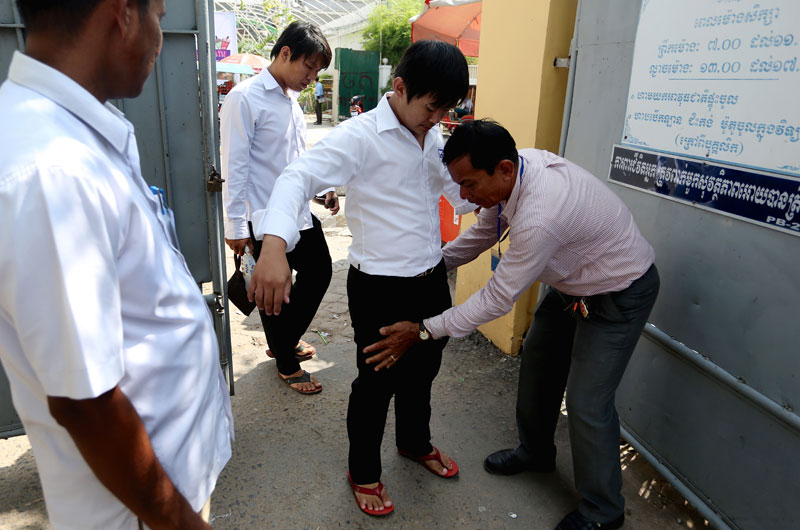In the lead-up to this week’s second-chance national high school exam, Chiep Srey Pich prepared almost exactly as she did for the first round two months earlier. The only extra hurdle to overcome this time, she said, was fear.
“We were so scared of the [Anti-Corruption Unit] observers,” the 18-year-old said of the first round in August, just minutes after handing in her test Tuesday at Chea Sim Santhormuk High School in Phnom Penh.
“Many of the questions, I knew the answer, but I felt like I could not concentrate and write freely because the observers would stand over me and stare at me very seriously,” she said. “It was scary.”
Ms. Srey Pich scored a 44 percent on the first 10-subject exam, just 3 percentage points shy of the Ministry of Education’s benchmark for a pass and potential admission to university.
This time, however, she said she mentally prepared herself to block out the ACU observers, who were brought in to police the exam that for years has been marred by endemic cheating and bribery.
“The second time, I wasn’t so scared because I already experienced them,” she said.
Under new, strict conditions, nearly 75 percent of 89,937 candidates failed the first round—the lowest passing rate since 1994 and the third lowest since 1979.
After the results were made public, Prime Minister Hun Sen announced there would be a re-sit for all students except those who had been found trying to cheat.
In an interview following Mr. Hun Sen’s announcement, Education Minister Hang Chuon Naron defended the decision to hold a re-sit, reasoning that it was the best way to increase the number of graduates.
“You have two ways to [raise the number of students that] pass the exam,” Mr. Chuon Naron said. “[R]educing the standards, meaning reducing the score for passing, [is] not a good way to do, but increasing the knowledge, this is a good way to do.”
Days after the initial exam, the ministry uploaded to its website lesson summaries for math, physics, chemistry and biology—the subjects students fared worst in—to aid candidates in the second round.
Contacted Tuesday, Mr. Chuon Naron, who personally drafted the Khmer and history portions of the exam, said students who did not use the online study guides would be at a great disadvantage.
“There are some questions [on the exam] drawn directly from those lessons,” he said. “But they are exercises that require understanding; they can’t just be copied.”
The minister conceded that the study guides would serve as ideal cheat sheets, but said that from reports he had gathered so far, the number of students attempting to sneak papers into exam rooms “was about half as many as the first exam.”
While two adults were arrested in Phnom Penh on the first day of the second round on Monday—one for selling answers outside a school, the other for posing as an observer inside a school—ministry spokesman Ros Salin said the ACU was less busy Tuesday.
“Today, there have been no reports of…corruption during the second exam,” he said.
However, Rong Panha, an official at the Cambodian Independent Teachers’ Association, said he expected an uptick in the passing rate compared to the first round.
Many students had been taken by surprise by the increased vigilance during the first round and failed under the added pressure, he said. But like Ms. Srey Pich, he said, this time the students were ready.
“The ACU observers patrolling put a lot of pressure on the students, and they were not prepared for that,” he said.
For Ms. Srey Pich, who is counting on a passing grade in order to enter a university program to become a teacher, the second round was a necessary lifeline.
She, like many others, did not take the threat of new regulations seriously in the lead-up to the first round.
“No one ever believed that there would be so many [ACU] observers and that they would be so strict,” she said. “Many more students will pass the exam this time because they will be able to focus on the questions and not the observers.”
Asked if she thought she had done well enough to win a place at university, she said: “Yes.”
“This time, no problem.”
